News
Police justify op. Yukthiya, critics call it theatrics
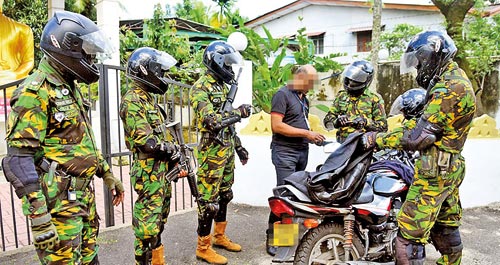
Wellampitiya: STF personnel question a man. Pic by Pradeep Pathirana
Authorities insist that a week-long island-wide police operation to crack down on narcotics trafficking and underworld activities has brought significant results, particularly with the seizure of assets worth millions of rupees allegedly earned through drug dealing. Nevertheless, questions have arisen over heavy handed police tactics, mass arrests of persons and the low quantity of drugs recovered.
The ‘Yukthiya’ (Justice) special operation launched throughout the island on December 17 has resulted in over 12, 000 arrests and the seizure of assets estimated by police to be about Rs. 300 million. The assets seized include various types of vehicles ranging from motorbikes to buses and SUVs, houses, commercial buildings and even a multi-day fishing trawler belonging to alleged drug traffickers.
Thousands of police officers and Special Task Force (STF) personnel throughout the island have been carrying out searches and raids since the operation began. They are being assisted by the military. Police claim they have been able to disrupt networks of leading drug traffickers due to the operation by arresting their associates and seizing assets belonging to the traffickers.
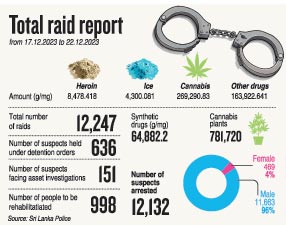 The ‘Yukthiya’ operation is a concept of Public Security Minister Tiran Alles and is being spearheaded by Acting Inspector General of Police (IGP) Deshabandu Tennakoon. Addressing a media briefing at the Presidential Media Centre on Thursday (21), Minister Alles underlined that public support was crucial for the success to curb drug trafficking and underworld activities. If such support is received, he expressed confidence that drug trafficking and underworld activities can be eradicated from the country by June next year.
The ‘Yukthiya’ operation is a concept of Public Security Minister Tiran Alles and is being spearheaded by Acting Inspector General of Police (IGP) Deshabandu Tennakoon. Addressing a media briefing at the Presidential Media Centre on Thursday (21), Minister Alles underlined that public support was crucial for the success to curb drug trafficking and underworld activities. If such support is received, he expressed confidence that drug trafficking and underworld activities can be eradicated from the country by June next year.
Minister Alles further said that intelligence reports had identified 4665 key individuals involved in drug trafficking and that 731 such persons had been arrested during the first four days of the operation alone. These include several individuals who had not been mentioned in the initial intelligence reports.
As of yesterday (23), police had arrested more than 12, 000 persons as part of the ‘Yukthiya’ operation. The vast majority of them had been picked up on suspicion and later released on bail. According to statistics released by police yesterday, 636 are being held and investigated under detention orders while 151 are being investigated by the Illegal Assets or Property Investigation Division over illegal assets. The number of persons who have been referred to drug rehabilitation during this period was 998.
A Kurunegala District organiser of the Samagi Jana Balawegaya (SJB), Amitha Bandara, was also among those arrested during the ‘Yukthiya’ operation on charges of heroin possession. SJB General Secretary Ranjith Madduma Bandara said on Thursday that Mr Bandara’s party membership had been suspended and he had been stripped of his organiser post following the arrest.
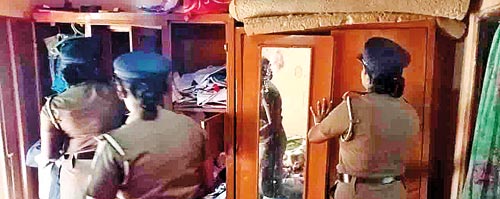
Police search a house in Haputale. Pic by Nayanananda Buwaneka
While police know the countries that some of the main drug traffickers are operating from, obtaining their extradition is complicated, Police Spokesman Senior Superintendent of Police (SSP) Nihal Thalduwa told the Sunday Times. Nevertheless, police can still hurt their operations by going after their local assets. “These traffickers don’t buy anything under their name. They funnel the drug money to their families and relatives and buy up vehicles and property under their names. Some of these persons don’t even have jobs, and can’t prove how they got the money to purchase those properties,” he said.
The operation however, has garnered criticism due to several reasons. Police have been accused of being heavy handed and showing scant regard for people’s privacy and dignity. Meanwhile, both Acting IPG Tennakoon and Minister Alles themselves are embroiled in recent controversies. Mr Tennakoon was among four police officers named by the Supreme Court (SC) this month as having violated the fundamental rights of a citizen who had been tortured following his arrest in 2010. The SC ordered the officers, including the Acting IGP, to pay compensation to the petitioner and also directed the National Police Commission to take disciplinary action against the officers named. Mr Alles meanwhile, became the first sitting Sri Lankan minister to be named in the International Consortium of Investigative Journalists’ Pandora Papers data trove as having offshore holdings. In light of these events, some have accused the ‘Yukthiya’ operation of being a media circus designed to divert attention away from these controversies.
Former Commissioner at the Human Rights Commission of Sri Lanka Ambika Satkunanathan pointed out that as per the police’s own statistics, only 7.7 kilograms of heroin had been seized island-wide during the first five days of the ‘Yukthiya’ operation. For an operation of such scale, the seized amount of heroin is “paltry,” she pointed out. She noted that going by the large amounts of drugs seized previously, it can be assumed that large quantities are coming into the country. “If after five days, hundreds of officers, 10,000 plus people arrested and you only seize 7.7 kg of heroin, that shows that what you are targeting are the low level users and dealers.”
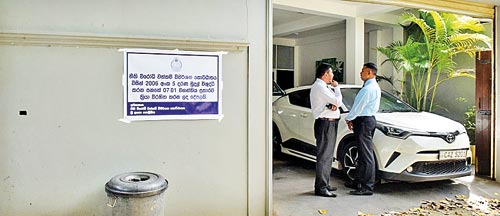
Seized property in the Galle District. Pic by D.G.Sugathapala
Those who sell small quantities are people selling drugs to support their drug habit, or are dealers at the bottom of the trafficking/selling hierarchy, Ms Satkunanathan added. “If they really wanted to address drug trafficking, they would be targeting the large-scale traffickers and places where drugs are stored. They would be targeting the middle or the top level. They could say the large scale traffickers are operating from abroad but not everyone is operating from abroad. There will be middle level dealers in the country and the drugs will be stored somewhere.”
In the north, whenever families of the disappeared are going to have a protest, military intelligence calls them two or three days prior to the protest to inquire as to who will be attending. “If the intelligence apparatus is that strong, are they expecting us to believe they don’t know who is trafficking these drugs and selling them?” she added.
Ms Satukunanathan was also critical of the police’s tactics specifically targeting poorer neighbourhoods, which she termed as the “criminalization of poverty.” While there is some truth to police claims that there is considerable drug dealing taking place in such neighbourhoods, one of the underlying reasons for that is poverty, which has worsened due to the economic crisis she pointed out. Such persons might be using or selling drugs but most are not making a lot of money from it but are trapped in a cycle of poverty, substance abuse, violence and imprisonment. Due to the economic crisis, it is likely many would have been pushed to seek exploitative employment, such as selling drugs.
“Targeting poor neighbourhoods is not going to help you solve this problem because those who are dealing in those neighbourhoods are at the bottom of the hierarchy. It’s criminalization of poverty. The state doesn’t do anything about the poverty that drives many people to engage in this activity. Instead, they conduct mass searches that violate people’s privacy and dignity and don’t adhere to due process. They arrest and imprison them, leading to further overcrowding of prisons and a further strain on state resources to maintain the prison population,” she remarked.
The government meanwhile is acting as if the Supreme Court judgement against Acting IGP Tennakoon was not delivered, which is an insult to the country’s highest court, Ms Satkunanathan said. “If they are conducting a serious operation, why do they need to have cameras filming them directing it? The Acting IGP is a public servant holding a power in trust to be used only for the benefit of the public. What’s happening is more like theatre. This appears to be a publicity campaign which is very inappropriate for a public officer,” she said of the Acting IGP’s media blitz regarding the operation. Meanwhile, Minister Alles, who has been exposed in the Pandora Papers as owning offshore holdings, has not even offered an explanation about them, she further said.
Police Spokesman SSP Thalduwa said police conduct both targeted raids aimed at specific houses and properties and cordon and search operations covering entire neighbourhoods. The latter is being done for several reasons. One is that such neighbourhoods have a high prevalence of drug dealing. Another reason is that some of those being sought by police tend to hide in neighbouring houses if they come to know police are coming.
Regarding the arrests of low level drug dealers, SSP Thalduwa noted the drug trafficking network was like a pyramid. “There are very few at the top and they are hard to get to straight away. But we can start at the bottom by going after the dealers on the ground. By also eroding their support, we can work our way to the top.”
He acknowledged that the majority of those arrested had been taken into custody on suspicion and have already been released on bail. “In some cases, we do know they are dealing in drugs though we couldn’t find any drugs on them at the time. But we do warn them when they are being released that we know what they are doing and tell them to stop,” he added.
Relatives of several persons who had been arrested by police during the ‘Yukthiya’ operation have already reached out to the Committee for Protecting the Rights of Prisoners, its President Senaka Perera told the Sunday Times. “Under Article 13(5) of the Constitution, every person is entitled to the presumption of innocence until proven guilty, yet this is not what’s happening now. If the police suspect someone, they must investigate and then arrest them. The police can’t prejudge people as being guilty of crimes. That is up to the courts to decide,” he noted.
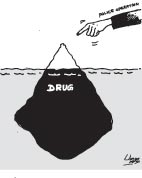 Mr Perera also questioned how any real ‘Yukthiya’ (Justice) can be expected from a police whose own officers have been found time and again of being guilty of serious violations of human rights, including custodial deaths of suspects. He said that this year alone, 16 police officers have been arrested over three custodial deaths – namely those of A.G.S. Preethi Kumara at the Police Narcotics Bureau in January, R. Raj Kumari at the Welikada Police Station in May and Jeyarasa Alex at the Vadukkodai Police Station in November.
Mr Perera also questioned how any real ‘Yukthiya’ (Justice) can be expected from a police whose own officers have been found time and again of being guilty of serious violations of human rights, including custodial deaths of suspects. He said that this year alone, 16 police officers have been arrested over three custodial deaths – namely those of A.G.S. Preethi Kumara at the Police Narcotics Bureau in January, R. Raj Kumari at the Welikada Police Station in May and Jeyarasa Alex at the Vadukkodai Police Station in November.
The judiciary has officially declared all of these deaths that occurred while in police custody as murders and further legal investigations are currently underway, said Mr Perera. “Justice is a sacred thing and must be handled very carefully. We are not pointing this out to discourage police officers from performing their duties. But justice will not be served simply by calling an operation by that name,” he noted.
| Driver’s ordeal after being labelled a druggie | |
| How safe are the ordinary law-abiding citizens from acting Inspector General of Police, Deshabandu Tennekoon’s weeklong drive to reign in drug peddlars and those in the criminal underworld?Here is a story that highlights that the public would have to fear not only the drug lords but sometimes even the Police who want to catch them.Sampath (not his real name) is the driver of a professional who lives in Nugegoda. His chores last Wednesday was to take the car, rented from a private source, for repairs to a garage not far from Battaramulla town. The complaint – after running for a short distance, the engine was overheating, and the vehicle was stalling on the road. It would take at least a minimum of three hours for it to cool down. Only then would it start. Confident that they had resolved the issue, the garage released the vehicle. The time was around 4.10 p.m.The driver was on his way to Wijerama along Jaya Road that connects Old Kottawa Road. The engine overheated and stalled near the power station, barely a kilometre away. With the help of passersby, he moved the vehicle to a side and waited. Through experience, he knew he would have to wait a few hours.As he stood near the vehicle, in came three motorcycles mounted by two men in each with civilian clothes. The time was past 7 p.m. The one on the first motorcycle, sporting a beard, asked the driver “Umba kudu karayek neyda. Methana Mokadda karanney” You are a druggie. What are you doing here?” His explanation that he was waiting till the engine cooled down was of no avail. Not even his plea that the vehicle belonged to a retired Major General and was being hired by his employer, a professional. “Api owa passey balagamu,” he retorted.Then the bearded person, said they were from a unit (he did not identify) that had the power to go to any part of the country and search for anyone, be it high or low. The driver was forced to open the door and start the engine. This time, to his bad luck, the engine started on the second try. Then the bearded person and another got into the vehicle. They also ‘ordered’ two other persons who they have “arrested” earlier to get into the car. Soon, it became a mobile Police Station. As the driver cris-crossed the by lanes and small roads, (which he cannot identify), he was under interrogation. The language used was “umba.” The driver was shivering. All this while, the two telephones in the car (one used to contact the driver and the other his personal number) were ringing. The captors did not allow the driver to answer the calls. At one point, they checked whether the phone numbers in the phones held by the two “suspects” were there in the two phones. There were no calls. “The way they conducted themselves, I feared someone would introduce some drugs on me and implicate me,” Sampath told the Sunday Times. “That is why I addressed all of them as Buddhu Mahaththuru and worshipped them,” said Sampath. He said he had even forgotten the name of the person he was working for the way he was handled. “Then their tone changed. They started calling me Putha and later Malli. All this while I was driving,” Sampath said. He added that “occasionally one of the men would point at me and tell the suspects that they also should behave well like me.” While the interrogation went on, I realized they were looking for more suspects. “I told them that my petrol level had dropped to just one bar,” said Sampath. They gave me directions on how to get to Mirihana Police area and then to where I worked,” said Sampath. The time was 10.20 p.m. Acting Police Chief Deshabandu must reign in his over enthusiastic officers and men before he cracks down on drug peddlars and narcotic dealers. In this instance, he used the car they seized and petrol for his crackdown operation. His men suspected the driver, who is none other than the son of a Police Sergeant of a Police Station in the Colombo District. The car owner is a retired Major General. The professional is a journalist attached to the Sunday Times. These could have been easily verified by his men. They seemed not interested. |
The best way to say that you found the home of your dreams is by finding it on Hitad.lk. We have listings for apartments for sale or rent in Sri Lanka, no matter what locale you're looking for! Whether you live in Colombo, Galle, Kandy, Matara, Jaffna and more - we've got them all!

